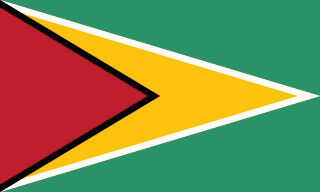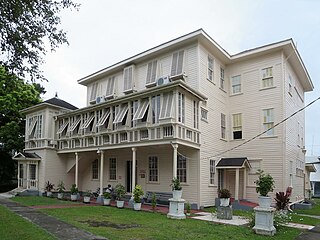
Georgetown is the capital and largest city of Guyana. It is situated in Demerara-Mahaica, region 4, on the Atlantic Ocean coast, at the mouth of the Demerara River. It is nicknamed the "Garden City of the Caribbean." It is the retail, administrative, and financial services centre of the country, and the city accounts for a large portion of Guyana's GDP. The city recorded a population of 118,363 in the 2012 census.

The Arawak are a group of Indigenous peoples of northern South America and of the Caribbean. Specifically, the term "Arawak" has been applied at various times from the Lokono of South America to the Taíno, who lived in the Greater Antilles and northern Lesser Antilles in the Caribbean. All these groups spoke related Arawakan languages.

The Cariban languages are a family of languages indigenous to north-eastern South America. They are widespread across northernmost South America, from the mouth of the Amazon River to the Colombian Andes, and they are also spoken in small pockets of central Brazil. The languages of the Cariban family are relatively closely related. There are about three dozen, but most are spoken only by a few hundred people. Macushi is the only language among them with numerous speakers, estimated at 30,000. The Cariban family is well known among linguists partly because one language in the family—Hixkaryana—has a default word order of object–verb–subject. Prior to their discovery of this, linguists believed that this order did not exist in any spoken natural language.

The Guyana national football team, nicknamed the Golden Jaguars, represents Guyana in international football and is controlled by the Guyana Football Federation. It is one of three South American nations to be a member of the Caribbean Football Union of CONCACAF alongside Suriname and French Guiana. Until the independence of Guyana (1966), it competed as British Guiana. They qualified for the Caribbean Nations Cup in 1991, coming fourth, and in 2007. Guyana has never qualified for the FIFA World Cup, but on 23 March 2019 they qualified for the first time for the CONCACAF Gold Cup.

Je–Tupi–Carib is a proposed language family composed of the Macro-Je, Tupian and Cariban languages of South America. Aryon Rodrigues (2000) based this proposal on shared morphological patterns. In an earlier proposal, Rodrigues (1985) had also proposed a Tupí-Cariban language family.

The Guyana national cricket team is the representative first class cricket team of Guyana. The side does not take part in any international competitions, but rather in inter-regional competitions in the Caribbean, such as the Regional Four Day Competition and the Regional Super50), and the best players may be selected for the West Indies team, which plays international cricket. Guyana has participated in the South American Cricket Championship for some editions, but were represented by an overage "masters" team. The team competes under the franchise name Guyana Harpy Eagles.

The Walter Roth Museum of Anthropology is a museum of anthropology in Georgetown, Guyana and claims to be the oldest such museum in the English-speaking Caribbean region. It was established in 1974, but not opened to the public until 1982. It is located at 61 Main Street, North Cummingsburg, Georgetown.

The Ireng River forms part of Guyana's western border with Brazil. It flows through the valleys of the Pakaraima Mountains for most of its length. It is the only major river in Guyana which flows from North to South, up to its confluence into the Takutu River. It is one of the northernmost tributaries of the Amazon River system.
Mount Ayanganna is a sandstone tepui in the Pakaraima Mountains of western Guyana, and located 85 kilometres (53 mi) east of Mount Roraima.
The Aparai or Apalai are an indigenous people of Brazil, who live in Amapá and Pará states. A little community is located in French Guiana, in Antecume Pata. They were sedentary slash-and-burn farmers, necessitating periodic relocation as soil became exhausted, but also hunters and gatherers. They spoke a Carib language and in the 20th century their subsistence shifted towards craftwork as they adapted to modern Brazil and the cash economy.
Abū Karib As’ad al-Kāmil, called "Abū Karīb", sometimes rendered as As'ad Abū Karīb, full name: Abu Karib As'ad ibn Hassān Maliki Karib Yuha'min, was king of the Himyarite Kingdom. He ruled Yemen from 390 CE until 420 CE, beginning as a coregency with his father Malkikarib Yuhamin followed by becoming sole ruler in 400. As'ad is cited in some sources as the first of several kings of the Arabian Peninsula to convert to Judaism, although contemporary historians have ascribed this transition to his father. He was traditionally regarded as the first one to cover the Kaaba with the kiswah.

Guyana, officially the Co-operative Republic of Guyana, is a country on the northern coast of South America, part of the historic mainland British West Indies. Georgetown is the capital of Guyana and is also the country's largest city. Guyana is bordered by the Atlantic Ocean to the north, Brazil to the south and southwest, Venezuela to the west, and Suriname to the east. With a land area of 214,969 km2 (83,000 sq mi), Guyana is the third-smallest sovereign state by area in mainland South America after Uruguay and Suriname, and is the second-least populous sovereign state in South America after Suriname; it is also one of the least densely populated countries on Earth. The official language of the country is English, although a large part of the population is bilingual in English and the indigenous languages. It has a wide variety of natural habitats and very high biodiversity. The country also hosts a part of the Amazon rainforest, the largest tropical rainforest in the world.
Taruma (Taruamá) is a divergent language of northeastern South America. It has been reported to be extinct several times since as far back as 1770, but Eithne Carlin discovered the last three speakers living in Maruranau among the Wapishana, and is documenting the language. The people and language are known as Saluma in Suriname.
Macushi is an indigenous language of the Carib family spoken in Brazil, Guyana and Venezuela. It is also referred to as Makushi, Makusi, Macuxi, Macusi,Macussi,Teweya or Teueia. It is the most populous of the Cariban languages. According to Instituto Socioambiental, the Macushi population is at an estimated 43,192, with 33,603 in Brazil, 9,500 in Guyana and 89 in Venezuela. In Brazil, the Macushi populations are located around northeastern Roraima, Rio Branco, Contingo, Quino, Pium and Mau rivers. Macuxi speakers in Brazil, however, are only estimated at 15,000.

The history of the Jews in Guyana goes as far back as the 1600s. Representation has always been low, and by the 1930s there was neither an organized Jewish community nor a synagogue in the capital city of Georgetown. In the late 19th and early 20th centuries, several Jewish families immigrated to British Guiana from Arab lands to avoid persecution and expand business opportunities.
Hassan Yuha'min, full name Hassan Yuha'min ibn Abi Karib As'ad al-Himyari, was a Himyarite king who ruled in the 5th century CE. Originally, he ruled as part of a co-regency with his father, Abu Karib before ruling alongside his brother Sharhabil Ya'fur. Hassan Yuha'min has been featured in many Arabian legends, and is well-remembered for his rule.
Khaled Mossad Karib is a Qatari professional footballer who plays as left-back for Qatari club Al-Khor.
The Parukotoan languages are a subgroup of the Cariban language family. The languages are spoken in Brazil, Suriname, and Guyana.

Fort Island is an island in the Essequibo River located in the Essequibo Islands-West Demerara region of Guyana. It is about 16 kilometres (10 mi) from the mouth of the river, and to the east of Hogg Island. In 1687, a wooden fort was built on the island. In 1744, Fort Zeelandia was constructed and served as the capital of Essequibo, a Dutch colony which is nowadays part of Guyana. In 1752, the Court of Policy was built on the island as the legislative body for the colony.








